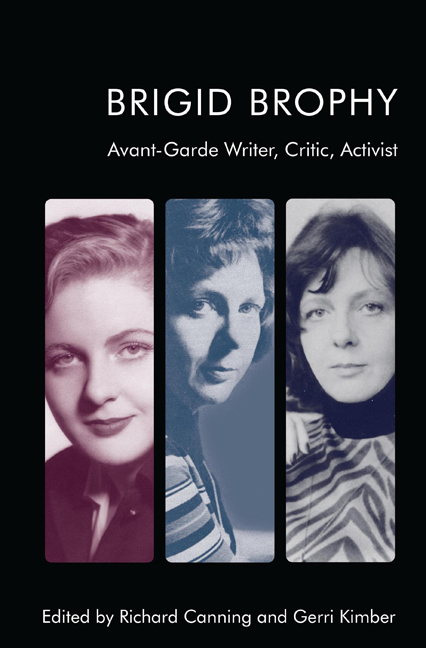Book contents
- Frontmatter
- Contents
- List of Illustrations
- Acknowledgements
- Introduction
- 1 Embodying the Fragments: A Refl ection on the Reluctant Auto-Biography of Brigid Brophy
- 2 Brigid Brophy’s Paradoxical World of Childhood
- 3 Intr oduction to ‘The Librarian and the Novel’
- 4 The Librarian and the Novel: A Writer’s View
- 5 Penetrating (the) Prancing Novelist
- 6 ‘Shavian that she was’
- 7 ‘Il faut que je vive’: Brigid Brophy and Animal Rights
- 8 Brigid Brophy’s Phenomenology of Sex in Flesh and The Snow Ball
- 9 Letter to Brigid
- 10 Encoding Love: Hidden Correspondence in the Fiction of Brigid Brophy and Iris Murdoch
- 11 ‘Heads and Boxes’: A Prop Art Exhibition Collaboration by Brigid Brophy and Maureen Duffy
- 12 Prancing Novelist and Black and White: Experiments in Biography
- 13 ‘Mo nster Cupid’: Brophy, Camp and The Snow Ball
- 14 ‘A Felicitous Day for Fish’
- 15 The Dissenting Feminist
- 16 A Certain Detachment?
- Notes on Contributors
- Index
15 - The Dissenting Feminist
Published online by Cambridge University Press: 17 October 2020
- Frontmatter
- Contents
- List of Illustrations
- Acknowledgements
- Introduction
- 1 Embodying the Fragments: A Refl ection on the Reluctant Auto-Biography of Brigid Brophy
- 2 Brigid Brophy’s Paradoxical World of Childhood
- 3 Intr oduction to ‘The Librarian and the Novel’
- 4 The Librarian and the Novel: A Writer’s View
- 5 Penetrating (the) Prancing Novelist
- 6 ‘Shavian that she was’
- 7 ‘Il faut que je vive’: Brigid Brophy and Animal Rights
- 8 Brigid Brophy’s Phenomenology of Sex in Flesh and The Snow Ball
- 9 Letter to Brigid
- 10 Encoding Love: Hidden Correspondence in the Fiction of Brigid Brophy and Iris Murdoch
- 11 ‘Heads and Boxes’: A Prop Art Exhibition Collaboration by Brigid Brophy and Maureen Duffy
- 12 Prancing Novelist and Black and White: Experiments in Biography
- 13 ‘Mo nster Cupid’: Brophy, Camp and The Snow Ball
- 14 ‘A Felicitous Day for Fish’
- 15 The Dissenting Feminist
- 16 A Certain Detachment?
- Notes on Contributors
- Index
Summary
Throughout the mid to late 1960s, women's groups began forming across Britain. Meetings chiefly took the form of small, informal gatherings in kitchens and church halls, but as the idea of ‘women's liberation’ as a collective politics gained momentum, increasingly larger venues were needed to accommodate rapidly growing numbers. On 27 February 1970 these groups congregated together for the first time at the inaugural National Women's Liberation Movement (WLM) conference at Ruskin College, Oxford. With upwards of 500 women attending, the conference marked a significant moment for British feminism in Britain, heralding a growing activism that consolidated around campaigns for free contraception, abortion rights, equal pay and access to education and equal employment opportunities. A well-known, even notorious writer, regarded by detractors and devotees alike as the embodiment of the progressive spirit of the Swinging Sixties, Brigid Brophy was not among their number. Despite her almost indefatigable work on behalf of animal rights and the Public Lending Right (PLR), Brophy's social activism did not extend, as might have been expected, into any formal commitment to the burgeoning feminist movement.
While Brophy was not easily persuaded by the doctrine of the wider WLM, she did consider herself to be a ‘natural’ feminist insofar as she was convinced of the innate equality between women and men, particularly concerning questions regarding the sovereignty of biology in the production and regulation of the nuclear family. She was publicly outspoken on the restrictions of monogamous marriage, declaring that matrimony was only one of an ‘infinitely flexible’ number of ways in which human sexual and kinship relation might be arranged. I suggest here, then, that although Brophy was broadly in agreement with some of feminism's aims, she was sceptical towards feminism as a homogeneous doctrine, especially when it involved questions of cultural and aesthetic authority; however, such scepticism did not hinder her from writing insightfully, if controversially, about what she called the ‘sex war’. Not so much an anti-feminist as a non-conformist one, Brophy's innate intellectual scepticism and commitment to what she regarded as rigorous logical inquiry habitually won out over any unreserved commitment to ideology.
- Type
- Chapter
- Information
- Brigid BrophyAvant-Garde Writer, Critic, Activist, pp. 220 - 234Publisher: Edinburgh University PressPrint publication year: 2020



